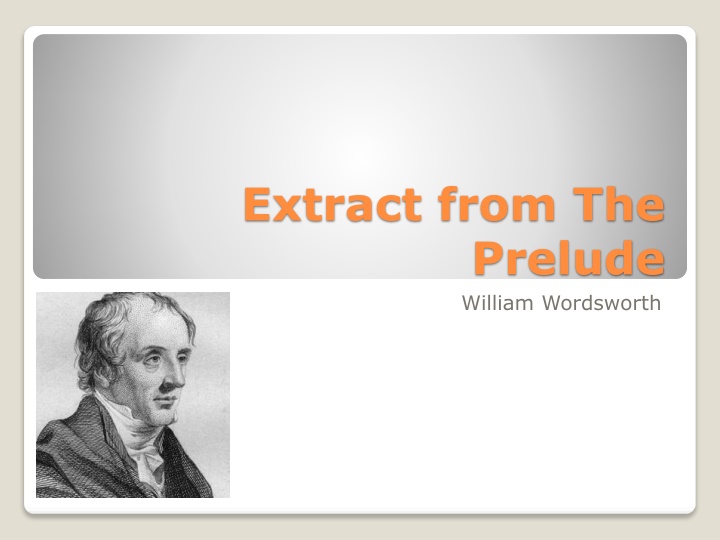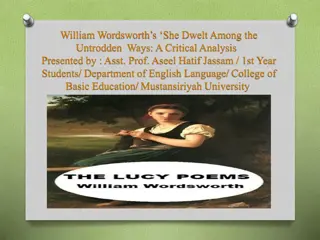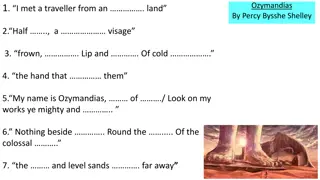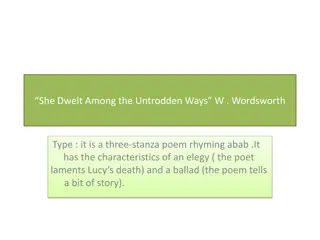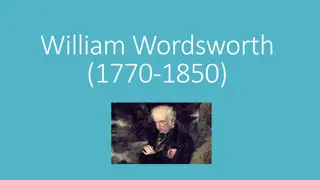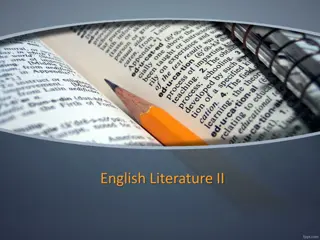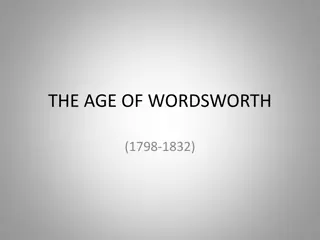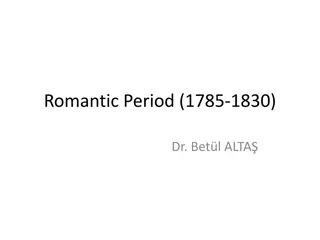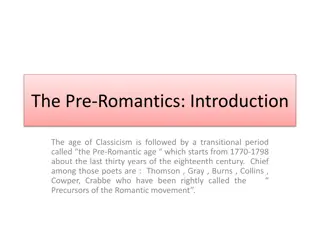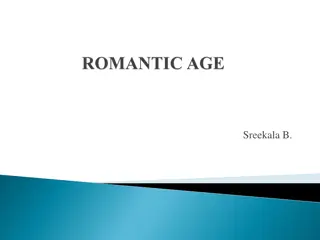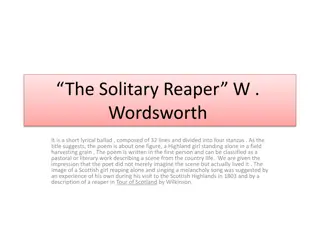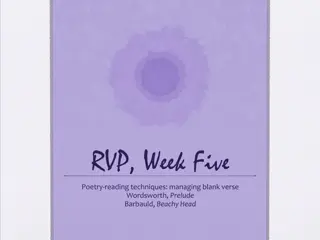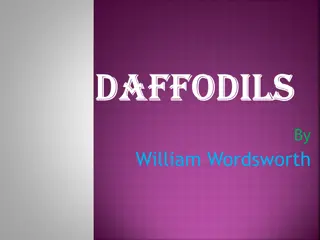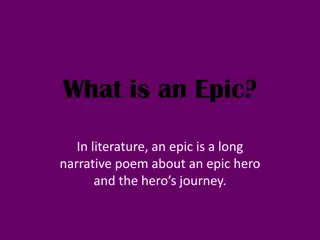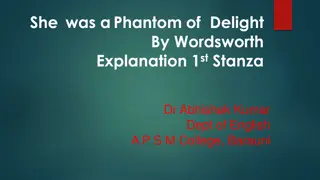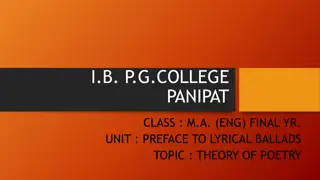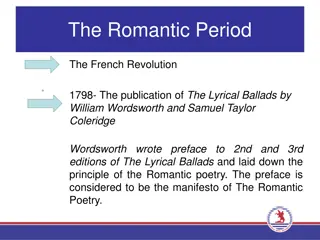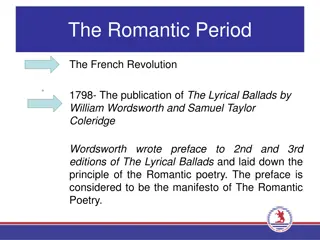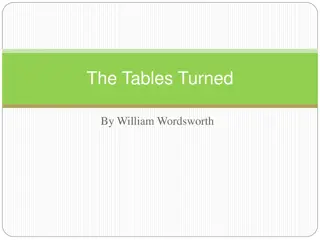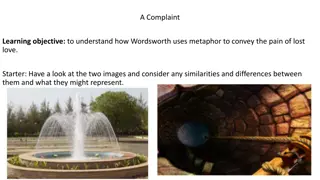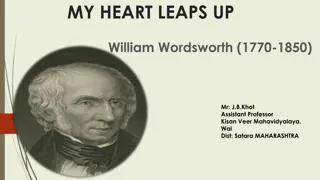Nature's Influence in a Romantic Epic: The Prelude by William Wordsworth
William Wordsworth, a Romantic poet, delves into his past experiences through "The Prelude," an autobiographical epic poem exploring the themes of man, nature, and society. Born in the same era as Blake, Wordsworth's troubled upbringing and love for nature shaped his poetic journey. The stolen boat incident in the Lake District reflects the overpowering influence of nature. As a Romantic poet, Wordsworth uses ordinary language to depict extraordinary encounters, emphasizing the supernatural power of the natural world.
Download Presentation

Please find below an Image/Link to download the presentation.
The content on the website is provided AS IS for your information and personal use only. It may not be sold, licensed, or shared on other websites without obtaining consent from the author.If you encounter any issues during the download, it is possible that the publisher has removed the file from their server.
You are allowed to download the files provided on this website for personal or commercial use, subject to the condition that they are used lawfully. All files are the property of their respective owners.
The content on the website is provided AS IS for your information and personal use only. It may not be sold, licensed, or shared on other websites without obtaining consent from the author.
E N D
Presentation Transcript
Extract from The Prelude William Wordsworth
1770-1850 (same era as William Blake who was a bit earlier) Born when George III was on the throne, died when George IV was on the throne Troubled relationship with parents Parents dead by the time he was in his early teens Split from his siblings and sent to live with hated relatives in the Lake District. Considered suicide He loved nature Supported of French Revolution (but later became disillusioned by its violence) A Romantic Poet Poet Laureate (but wrote best poetry very early in his life). William Wordsworth Context
This is just an extract from a three part epic poem (huge). Autobiographical poem. 28 years old when he started this poem, never actually published it. Presents an experience from his past and explores its philosophical importance. Theme is: man, nature and society The poem
Romanticism one of the first generation of Romantic poets = a dislike of urban life and embracing of the natural world. The Enlightenment came first focussing on realistic poems that instructed people. But society became aware of man s innate evil and it became unpopular to write about anything that might cause an uprising, therefore Romanticism is in opposition to Enlightenment and focussed on the power of the imagination, the supernatural and the use of ordinary everyday language. Genre
The boat stealing episode True story Takes place in The Lake District Ulswater Lake. He stole a rowing boat. Starts as exciting, but turns nasty when he encounters a huge mountain and he turns back. Can t stop thinking about it. You row facing backwards, he fixes himself on a craggy ridge but then he realises the mountain behind it is huge and scary behind him. (But the fear is metaphorical!) Overview
Takes place in the countryside The supernatural power of nature Language is almost entirely ordinary and everyday. Easy(ish) to understand! The Prelude as a Romantic poem
Who is her? Nature is personified. Why? To suggest that he was influenced by nature as a child. Looking back as an adult on what he did as a child. Enjambment used. Why? Suggests an inability to stop, the overwhelming effect of nature on the child. Blurting out his story. stealth connotations of sneaky and sly morally wrong because man is selfish and proud and takes what he wants. (comment on society it believes it can dominate nature) He is later humbled by the strength of the mountain = man is not superior to nature. Oxymoron: troubled pleasure Language
Positive magical imagery small circlessparkling light = ripples Present participles: stepping, leaving, sparkling. Climax point. Contrast with later negative experience. heaving . Simile like a swan Elfin pinnace = a light sailing vessel. He thinks his boat is magical, not just a little rowing boat. He exaggerates in his arrogance. Turning point line 21. usual syntax is: Subject- Verb-Object e.g. Mrs Gibbs loves Mr Gibbs. Now the syntax changes because there is a deliberate delayed reveal of the subject (the huge peak) and another delay before the verb (upreared it s head). It s a delayed revelation to increase suspense and tension = fear Personification now disappears, instead the mountain is labelled as it = contrast. He has now lost the power and loses his vocabulary, no longer expressive and full of imagery. This shows his shock at what he is seeing. Repetition of huge (like Bayonet Charge use of raw ) the poet is literally stuttering and cannot find words to describe his experience. Language cont
So it seemed = disclaimer. He is writing as an adult and now knows that the mountain wasn t chasing him. Perspective changes. More personification mythical quality like an epic poem. Thinks the mountain is chasing him. Vague language: in grave and serious mood reflects enormity of what has happened. Ending: narrative poems telling a story tend to be easy to understand until the end. The ending suggests that days later the poet still cannot shake his dark thoughts of the unknown . He is in shock and struggling to describe his feelings so uses vague language again: call it solitude . Repetition of no . Makes us aware of his realisation that he doesn t know everything. His pride has vanished. He can only explain what isn t happening. Forced to reflect. Language cont
One long verse no stanza breaks could overwhelm the reader just like nature. Helps reader empathise with poet s experience. Same as Paradise Lost. Epic poems are often cyclical. Stole line 30 suggests desperation and fear but echoes line 5 stealth . Structure
Epic poem full of exciting adventures and heroic feats. Usually very long. Usually legendary and historical events are covered e.g. Paradise Lost John Milton which influenced Wordsworth. Even steals a line (The world was all before me = literary allusion) Not entirely an epic poem since it does not really have one major event, the whole poem covers lots of events in his life. This is just an extract from the section that covers his childhood and school. The main event in the whole poem can be seen as his spiritual growth and explanation of why he is a poet. We can argue that the extract IS epic: we can argue that the awakening understanding of the power of nature is the event and that nature itself is the hero. Blank verse the poem has no rhyme scheme but written in iambic pentameter (Just like Paradise Lost). This was usually used for this type of long, philosophical poem. Form
Mans pride Man thinks he is in control and is arrogant/dominant doing what he wants. I.E. when he is rowing straight with his eye on the craggy bit, he thinks it is the utmost boundary end point. BUT it isn t. Self realisation that we don t know everything there is in fact more to the world than he first perceives. Man is insignificant and tiny. Humility he is humbled by the power of nature. There is a power greater than man. Views of man and society: condemned as prideful and arrogant. Nature is powerful and terrifying. Themes
In your own words, write a brief synopsis of the poem and its main themes. Check your learning
Use the table on the next slide, compare these two Romantic poems. For each point of comparison, fill in the detail and provide a piece of evidence to support your ideas. This could be a quotation or simply a fact about the poem. The box below contains some words and phrases that may be useful. nature power urban personal autobiographical public society stanzas first person rhyme scheme contrast personification metaphor simile reflection memory juxtapose Comparison with London
London (Blake) Point of comparison Extract from The Prelude (Wordsworth) Use of place Evidence: Evidence: Form and structure Evidence: Evidence: Use of language and imagery Evidence: Evidence: Viewpoint or voice Evidence: Evidence: Evidence: Message Evidence:
Chose one point of comparison and develop your ideas from the table into a paragraph that shows your knowledge of both poems. Remember to include: a clear comparative point at least one quotation the effect on the reader. Getting it into writing
